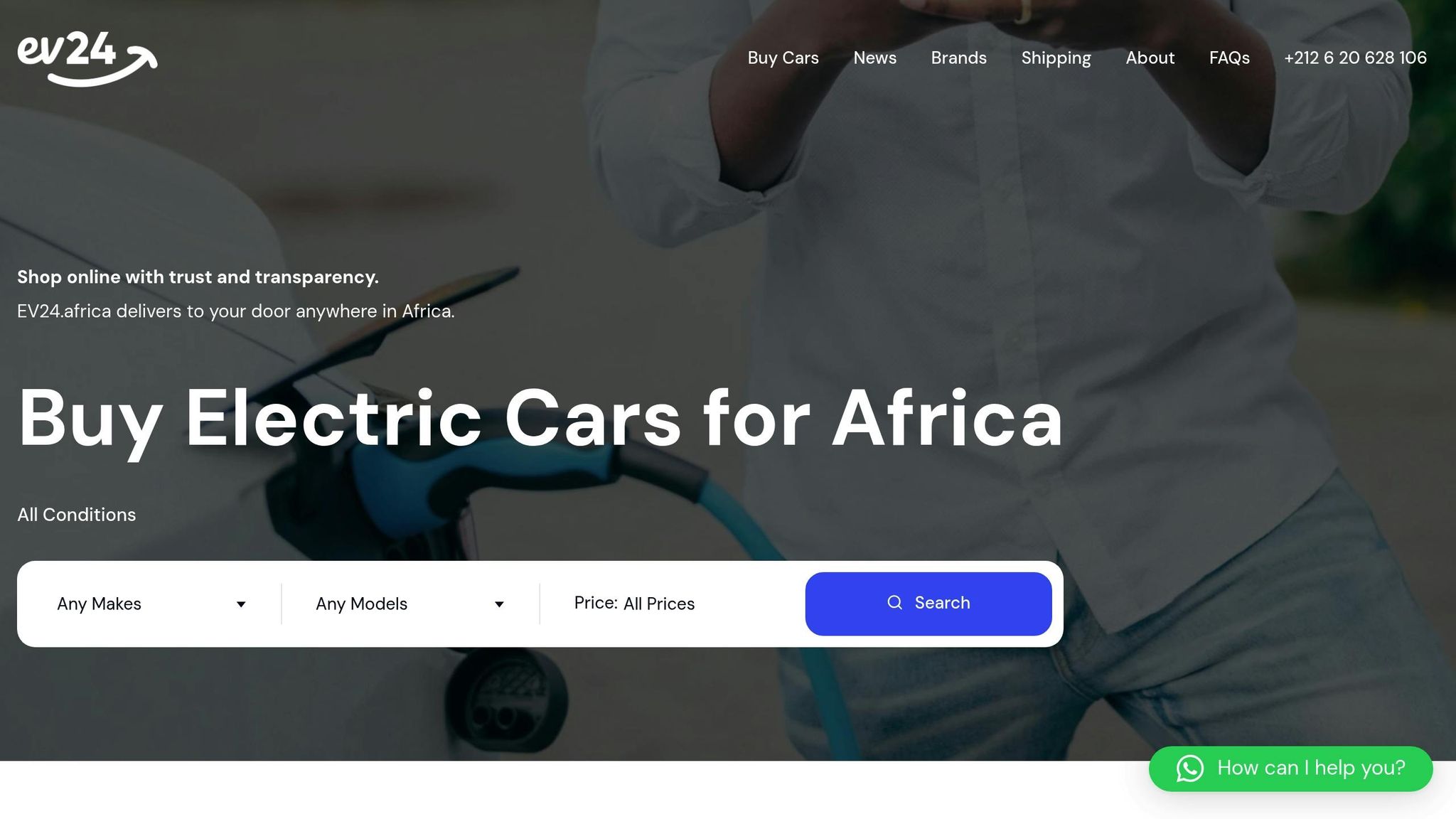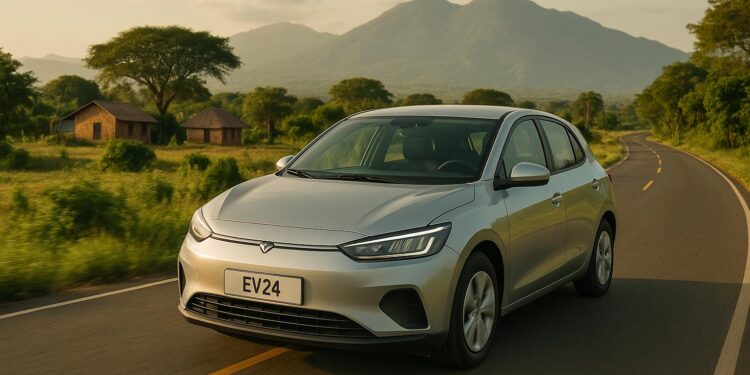Tanzania is leading the charge in East Africa’s electric vehicle (EV) adoption, with over 5,000 EVs already on its roads. Rising fuel costs and air pollution from imported gasoline vehicles have pushed the country to embrace cleaner alternatives. EV24.africa simplifies EV ownership by offering a user-friendly platform for sourcing, buying, and shipping EVs to Tanzania. Buyers benefit from tax exemptions, reduced fuel and maintenance costs, and access to affordable models like the GEELY PANDA MINI BASE ($5,880). With partnerships in over 40 countries, EV24.africa supports Tanzania’s shift to electric mobility while addressing challenges like limited charging infrastructure.
Tanzania unveils its first locally-made electric car
EV24.africa: Making Electric Car Ownership Easy

EV24.africa is transforming how people in Tanzania purchase electric vehicles (EVs) by acting as a one-stop shop for sourcing, shipping, and delivery. Their streamlined process combines an intuitive buying platform with dependable logistics services, making the journey to EV ownership straightforward.
As EV24.africa puts it, "We make importing and buying electric vehicles (EVs) easy, handling everything from sourcing to shipping and delivery in all 54 African countries."
The company has partnerships in over 40 countries, sourcing EVs from suppliers across Europe, Asia (including China), North America, and Japan. This global network means Tanzanian buyers can choose from a wide variety of vehicles to suit their needs.
A Complete EV Buying Platform
EV24.africa’s online marketplace allows customers to compare and purchase EVs with ease. The platform provides detailed specifications and transparent pricing, enabling buyers to make informed decisions. It features top EV brands like Tesla, BYD, and Volkswagen, offering options for every budget. For instance, the GEELY PANDA MINI BASE is available for $5,880, while the luxury VOYAH DREAMER EV is listed at $97,000.
Buyers can also request customized quotes through the platform, which factors in Tanzania’s tax benefits for EVs, such as a 100% exemption from VAT and customs duties. Delivery timelines are clearly outlined, with most vehicles arriving within 4 to 8 weeks.
Import and Delivery Services
EV24.africa integrates its purchasing platform with an efficient logistics operation, offering both door-to-door and port-to-port delivery options. Vehicles are shipped through the Port of Dar es Salaam and delivered to the buyer’s chosen location.
Customers can select from two shipping methods:
| Shipping Method | Cost | Vehicle Condition | Protection Level | Delivery Speed |
|---|---|---|---|---|
| RoRo Shipping | Lower cost | Must be operational | Limited exposure protection | Faster transit time |
| Container Shipping | Higher cost | Can be non-operational | Fully enclosed security | Slightly slower due to handling |
These options are part of EV24.africa’s comprehensive import process, which includes international shipping terms like DDP (Delivered Duty Paid) and FOB (Free on Board). With DDP, all duties and taxes are covered, while FOB gives buyers more control over shipping costs. The company also assists with customs clearance, vehicle registration, and import taxes to ensure compliance with Tanzanian regulations.
To enhance customer confidence, EV24.africa provides real-time tracking and updates, so buyers can monitor their vehicle’s location throughout the shipping process.
Younes Rabeh, the Business Manager at EV24.africa, highlighted their broader vision:
"In just three months, we’ve proven that the demand for electric mobility in Africa is not only real but accelerating. Our team is building more than a marketplace – we are laying the infrastructure and services to support Africa’s electric transition at scale."
EV Models and Pricing Options
EV24.africa offers a diverse range of electric vehicles, spanning from budget-friendly city cars to high-end luxury models. This platform connects Tanzanian buyers with leading EV brands such as Tesla, BYD, Volkswagen, XPeng, Leapmotor, Changan, Wuling, Mercedes-Benz, Citroën, and Peugeot. Whether you’re a first-time buyer or someone looking for a premium ride, there’s an option for everyone.
Since its launch in 2025, EV24.africa has received over 350 qualified vehicle requests from more than 30 countries, with initial deliveries already completed in ten nations.
Available Electric Vehicle Models
The platform offers a mix of passenger cars and light commercial vehicles, making it suitable for both personal and business use. Buyers can choose from a variety of new and certified pre-owned models, ensuring options for different budgets.
For those just stepping into EV ownership, compact city cars like the LINGBOX UNI provide an affordable and practical solution. These cars are ideal for navigating urban areas like Dar es Salaam, where commutes are short and traffic is often congested.
In the mid-range category, models like the BYD QIN PLUS EV 100 Kw deliver extra space and features, making them appealing to families and professionals. On the luxury end, EV24.africa offers high-tech models such as the ZEEKR 009 and VOYAH DREAMER EV, designed for buyers seeking sophistication and advanced technology.
A standout option is the DONGFENG eπ 008 EV, which strikes a balance between affordability and premium features. This model is particularly suited for business users, reflecting the growing demand for sustainable transportation in the region.
Pricing Structure and Currency Information
EV24.africa emphasizes transparent pricing and offers a range of flexible financing options. The platform provides upfront quotes tailored to various income levels in Tanzania.
| Vehicle Model | Price (USD) | Category | Target Buyer |
|---|---|---|---|
| LINGBOX UNI | $4,800 | Ultra-compact | First-time EV buyers |
| GEELY PANDA MINI BASE | $5,880 | Compact city car | Urban commuters |
| BYD QIN PLUS EV 100 Kw | $14,180 | Mid-range sedan | Families and professionals |
| DONGFENG eπ 008 EV | $28,700 | Premium mid-size | Business users |
| ZEEKR 009 | $85,000 | Luxury MPV | High-end buyers |
| VOYAH DREAMER EV | $97,000 | Ultra-luxury | Premium market |
Thanks to Tanzania’s exemption from VAT and customs duties, EV prices remain competitive with traditional gasoline vehicles. Additionally, the Ministry of the Economy has announced further reductions in import duties, making EVs an even more attractive option.
Chinese manufacturers play a key role in offering affordable EVs across Africa, with some models priced under $10,000. This allows EV24.africa to provide entry-level options that are within reach for many middle-class Tanzanians.
To make EVs even more accessible, the platform collaborates with partner banks to offer flexible financing solutions. Buyers can also take advantage of innovative payment methods, such as pay-as-you-go battery plans, daily mobile-money lease payments, and rent-to-own contracts.
"Electric vehicles are not only about sustainability; they also bring long-term savings on fuel and maintenance. With rising fuel prices and ongoing advancements in charging infrastructure, EVs are becoming a smarter investment. EV24.africa is here to support individuals and businesses in making this transition."
– Axel Peyriere, Co-Founder and CEO of AUTO24.africa
With its wide selection of models, competitive pricing, and flexible payment options, EV24.africa is well-equipped to meet the needs of Tanzanian drivers, whether they’re navigating city streets or looking for reliable business vehicles.
sbb-itb-d9186c2
How EVs Work for Tanzanian Drivers
Electric vehicles offered by EV24.africa are built to handle the unique demands of Tanzania’s urban and rural environments. These vehicles cater to the specific needs of Tanzanian drivers, ensuring they perform consistently across the country’s varied terrains. This adaptability is helping to build trust in electric mobility among local drivers.
EVs on Tanzanian Roads
Navigating Tanzania’s road network presents both opportunities and hurdles for electric vehicle adoption. In bustling cities like Dar es Salaam and Arusha, electric bikes and tricycles are increasingly being used as urban taxis. Meanwhile, safari operators are swapping out diesel engines in their trucks for electric motors, showcasing their ability to handle rugged landscapes while promoting eco-friendly tourism.
Take TRÍ, a Tanzanian brand of electric tuk-tuks, as an example. Their drivers report operating-cost savings of up to 90%, as electricity costs are significantly lower than petrol. These practical examples highlight the growing potential of EVs, while also emphasizing the importance of expanding the charging network to support further growth.
Charging Infrastructure Development
Tanzania’s charging infrastructure is evolving quickly to keep up with the rise in EV adoption. Local companies like eMobility Tanzania and GreenCharge Africa are stepping up by building solar-powered charging stations. At the same time, government incentives, including tax breaks and grants, are encouraging more investments in this sector. These efforts are creating a more supportive environment for EV24.africa users.
Projects aimed at installing charging stations in major cities and forming partnerships with energy companies are actively closing the infrastructure gap. For instance, Denis Leboutex, a lodge and fleet owner, saves up to $800,000 annually by operating 20 electric vehicles. However, challenges persist, especially in rural areas where charging stations remain scarce. Yet, ongoing investments and government policies are paving the way for wider EV adoption. A national policy framework is also being developed to regulate the import, registration, and use of EVs in the country.
EV24.africa plays a proactive role by guiding its customers on charging options and connecting them with local infrastructure providers. Additionally, regional advancements, fueled by growing investments in charging networks across East Africa, are driving down costs and improving access for individual EV owners.
Benefits of Electric Cars in Tanzania
Electric vehicles (EVs) from EV24.africa offer a range of advantages for drivers in Tanzania. From saving money on fuel and maintenance to contributing to cleaner air in urban areas, EVs are becoming a practical choice for individuals and businesses alike. These benefits make them an appealing alternative to traditional vehicles powered by internal combustion engines (ICEs).
Money Saved with Electric Cars
Switching to EVs can lead to significant savings. Electricity costs in Tanzania average about 230 TZS per kWh ($0.09), while petrol costs around 3,210 TZS per liter ($1.19). This means EVs can cut fuel expenses by as much as 86% compared to gasoline-powered cars. Additionally, maintenance costs are reduced by about 50% because EVs have fewer moving parts. Unlike traditional cars, EVs don’t require oil changes, spark plug replacements, or other routine services, which can add up over time.
"Maintenance costs for EVs are minimal in comparison to ICE cars",
- Phil Hodge, EV expert.
Hodge highlights that EVs eliminate many standard maintenance tasks, such as replacing oil filters, air filters, and timing belts, or servicing transmissions. This not only saves money but also reduces the hassle of frequent trips to the mechanic. Over the long term, these savings make EVs an economical option for many drivers.
Environmental Impact and Clean Air
Electric vehicles also play a critical role in improving air quality, especially in densely populated cities like Dar es Salaam and Arusha. By reducing emissions, EVs help create a cleaner and healthier urban environment. Platforms like EV24.africa make it easier for Tanzanians to adopt this eco-friendly transportation option, which aligns with the country’s goals for sustainable urban development.
One standout feature of EVs is their regenerative braking system, which reduces brake wear and minimizes the release of particulate matter into the air. This not only enhances the durability of the vehicle but also decreases its environmental footprint, making EVs a smart choice for those who care about cleaner cities.
Electric vs. Gas Cars: Cost Comparison
The financial benefits of EVs become even clearer when comparing their costs side by side with gasoline vehicles:
| Cost Factor | Electric Vehicles | Gasoline Vehicles | Savings/Difference |
|---|---|---|---|
| Fuel/Energy Costs | 230 TZS per kWh ($0.09) | 3,210 TZS per liter ($1.19) | Up to 86% savings on fuel |
| Annual Maintenance | Around $150 CAD | Around $2,000 CAD | 50% lower maintenance costs |
| Upfront Purchase Price | Higher due to taxes | Lower initial cost | EVs cost more upfront |
| Government Incentives | Tax breaks and waivers | Standard taxation | Potential savings on EVs |
| Total Cost of Ownership | Higher currently | Lower initially | Gap narrowing over time |
Although the upfront cost of EVs is still higher, falling battery prices and government incentives are helping to close the gap.
"The expectation is EVs will continue to get cheaper, largely driven by [lower] battery costs",
- Maxwell Woody, University of Michigan‘s Center for Sustainable Systems.
Chinese manufacturers like BYD and Geely are also making EVs more affordable. For instance, the BYD Seagull is priced under $10,000 in some African markets, offering a viable option for Tanzanian consumers. Through EV24.africa, these affordable models are becoming increasingly accessible, paving the way for broader EV adoption in Tanzania.
Conclusion: EV24.africa Leading Tanzania’s Electric Future
EV24.africa is emerging as a key player in Tanzania’s shift toward electric vehicles, aiming to transform the country’s transportation landscape. With a proven track record across Africa – over 350 qualified vehicle requests from more than 30 countries and deliveries to ten nations so far – the platform is clearly addressing a growing need for electric mobility across the continent. This momentum positions Tanzania to take a leading role in advancing sustainable transportation in the region.
Currently, Tanzania allocates a significant portion of its foreign exchange to petrol imports, making the transition to electric vehicles not just environmentally smart but economically strategic. The timing couldn’t be better. The African electric vehicle market, valued at $15.63 billion in 2024, is projected to grow by 8.95% annually from 2025 to 2029, reaching $314.2 million. With EV24.africa’s forward-thinking platform, Tanzania is well-poised to tap into this expanding market.
Axel Peyriere, CEO and Co-Founder of AUTO24.africa and Africar Group, highlighted the importance of this initiative:
"EV24.africa is a strategic move aligned with our mission to reshape mobility in Africa. Backed by Stellantis and built with a lean, digital-first approach, we are uniquely positioned to scale EV adoption across the continent and make sustainable transport a reality for all."
The success of similar transitions in other emerging markets shows how quickly electric vehicle adoption can gain traction when supported by the right infrastructure and policies. This offers a glimpse of the opportunities ahead for Tanzania.
For now, focusing on electric two-wheelers – already an affordable and practical option for many consumers – provides a sensible entry point. As charging networks expand and government incentives grow, electric cars will also become more accessible to a broader audience.
EV24.africa’s innovative, digital-first model goes beyond simply selling vehicles. The company is building a comprehensive ecosystem for sustainable transportation, delivering benefits not just to Tanzanian consumers and businesses but also to the environment. This approach ensures that EV24.africa isn’t just part of the electric vehicle revolution – it’s helping lead it.
FAQs
What is EV24.africa doing to improve access to charging stations for electric vehicles in Tanzania?
EV24.africa is taking significant steps to grow Tanzania’s EV charging network by installing public charging stations in strategically chosen areas. They are also ensuring these stations integrate seamlessly with the local energy grid and remain accessible to all EV owners, making them practical for everyday use.
Beyond infrastructure, EV24.africa offers support services designed to help drivers shift to electric vehicles with ease. By simplifying this transition, they are making sustainable transportation more approachable for consumers. These initiatives are geared toward solving the shortage of charging points and boosting the adoption of EVs across Tanzania.
What are the cost-saving advantages of buying an electric vehicle from EV24.africa compared to a traditional gas-powered car?
Switching to an electric vehicle through EV24.africa can help you cut fuel costs by as much as 70% while slashing maintenance expenses by nearly 50%. The reason? Electric vehicles have a simpler design with fewer moving parts, making them more energy-efficient and less prone to wear and tear compared to traditional gas-powered cars.
To make the transition even easier, EV24.africa offers tailored loan options with competitive interest rates and flexible repayment terms. This means you can enjoy the financial perks of driving an EV while contributing to a cleaner, more sustainable future.
What financing and payment options does EV24.africa provide to help Tanzanians afford electric vehicles?
EV24.africa is breaking down barriers to electric vehicle ownership by providing a range of flexible financing and payment options. Buyers can choose from bank loans, mobile money payments, cryptocurrency, or installment plans offered through partner banks.
By catering to the varied financial situations of Tanzanian buyers, these solutions make eco-friendly and budget-friendly transportation more attainable for a wider audience.
Related posts
- Tanzania’s EV Adoption: Key Challenges
- Tanzania’s EV Import Duty Exemptions Explained
- Electric Cars in Tanzania: Affordable Options You Can Buy Today ⚡️
- Is Now the Right Time to Switch to an Electric Vehicle in Tanzania?




